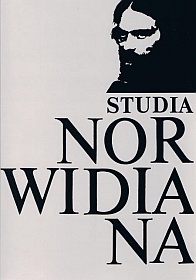Element and elementary in Norwid’s writings (transl. by Tadeusz Karłowicz)
Abstract
The text discusses the meanings the poet ascribes to the words given in the title. The word element appears 61 times in his works. In most contexts (50 cases) the author understands the word in the same way his contemporaries do, that is in the meaning of “a group of people that constitutes a separate circle” (22 cases), “component” (18 cases) and “natural element” (10 cases). What is interesting, 12 times he uses the word element in the meaning that is not found in dictionaries, one pointing to “immediate situations, realities, circumstances, determinants (most often living or material ones)”. However, he does not use the word in the meaning of “beginning, beginner teaching, prime principles” or in the meaning of “natural element as the only condition for life” (Słownik wileński – Vilnius Dictionary); he also does not use the special meanings of the word element.
The adjective elementary appears in Norwid's works 44 times, most often in the meanings recorded in dictionaries: “basic, fundamental, simplest” (28 cases), “teaching the beginnings, initial” (6 cases), “natural, primary” (3 cases). There are also such uses of the word, in which the poet, referring to the meaning “natural, primary”, enriches it with aspects that are not included in dictionaries. We encounter such a situation in contexts containing individual connotations, conventionalized at least as far as the poet's idiolect is concerned. The word elementary is not used in Norwid's works in the function of a mathematical expression. Also, it is not used in the meaning “being the cause of a natural element”. The way the poet understood the words element and elementary proves a modern character of his poetical language.
Copyright (c) 2011 Studia Norwidiana

This work is licensed under a Creative Commons Attribution-NonCommercial-NoDerivatives 4.0 International License.





